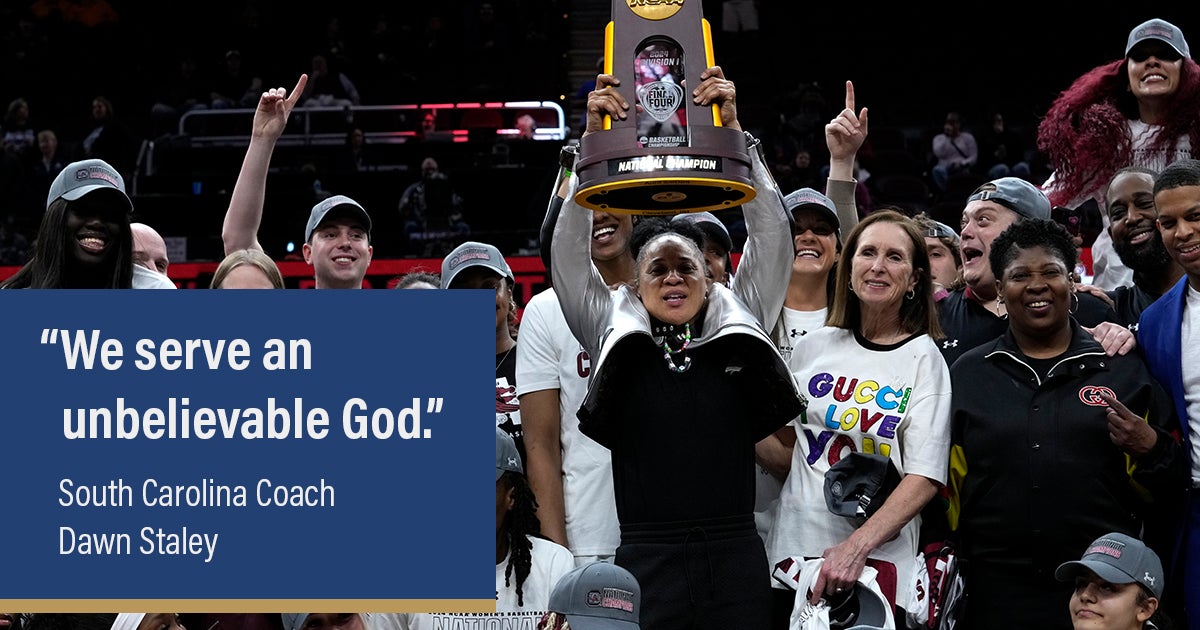
by Jorge Gomez • 3 min read
Some groups in our country really seem to hate it when coaches pray or live out their faith.
The latest example? University of South Carolina women’s basketball coach Dawn Staley, whose team won the national championship this past Sunday.
She’s being attacked for expressing her religious beliefs. Staley is known for giving God the glory in post-game press conferences. She often posts on her own social media thanking God for the team’s success.
“We serve an unbelievable God.” – Dawn Staley after winning the national title. pic.twitter.com/UxHvAMHDCh
— OutKick (@Outkick) April 7, 2024
The Daily Beast recently ran a hit piece criticizing her and claiming she’s “violating her players’ religious freedom.” The story relies on statements from the Freedom From Religion Foundation—infamous for complaining about virtually any public expression of faith. FFRF has been attacking Staley for years.
This is the same group that went after Auburn University football coach Hugh Freeze for attending “Unite Auburn,” an after-hours worship gathering. At that event, hundreds of students were baptized. When one of his players asked if he would help baptize him, Coach Freeze did.
They also attacked University of Colorado football coach Deion Sanders because he prayed and praised God when he got the head coaching job.
By the way, First Liberty stepped in and successfully defended both of those coaches. We made it clear that just because you’re a public employee, it doesn’t mean your constitutional rights are suspended. We helped make sure that neither Coach Freeze or Sanders were censored or punished, because they did nothing wrong.
Still, for some reason, opponents of religion in America can’t seem to grasp the concept that coaches have constitutional rights. Time after time, they bring up the same talking points about government, coercion and the Constitution.
“Using a coaching position, especially one of this stature, to promote Christianity, amounts to religious coercion,” FFRF said recently about Coach Staley. But they did not point to a single student or staff member who believed he or she was excluded or coerced by Coach Staley’s religious exercise. Plus, a lot of what they argue is based on legal precedent that’s no longer applicable.
Many times, these warnings about so-called “violations of the separation of Church and State” or “coercion” rely on an outdated legal test that the U.S. Supreme Court disavowed in Kennedy v. Bremerton. The Court’s precedent in Kennedy made clear that public school employees may engage in religious expression and exercise.
Just because a college coach is engaging in prayer or other private religious expression does not mean it’s “coercion.” These arguments fail to acknowledge the difference between government speech and private speech, which is a highly important distinction the Supreme Court considers regarding public employee religious speech.
We do like to be crystal clear about one thing: a coach may not force students to engage in religious exercise.
We should, however, point out that in Kennedy, the Supreme Court rejected the notion that the mere presence of religious activity is somehow coercive. Instead, the Court found no coercion “where there is no evidence anyone sought to persuade or force students to participate.”
So, let’s say a coach hosts a pregame devotional, as Staley often does. As long as a college coach makes clear to the players that it’s a strictly voluntary event or activity, then they’re following the law and the Constitution.
In an interview with OutKick, Staley made it clear that she does share her faith with her players, but doesn’t make them do anything that they do not want to do.
“I don’t force anything on our players, not anything,” she said. “I have (a player) that is a Jehovah’s Witness. When we do our prayers and our Scripture, I ask her, does it offend her? Because if it did, we would do something different.”
Coach Staley shouldn’t cave in to the pressure of outside groups. Whether she prays, posts about her faith on social media or thanks God on national television after a game, this is her private speech and it’s entitled to constitutional protection. She’s fully within her rights to continue living out her faith.
OutKick: Dawn Staley Fights Back Against People Who Want Her Prayers ‘Banned’
Fox News: Dawn Staley immediately praises God after South Carolina wins national championship
Deseret News: ‘We serve an unbelievable God,’ says Dawn Staley after South Carolina claims championship